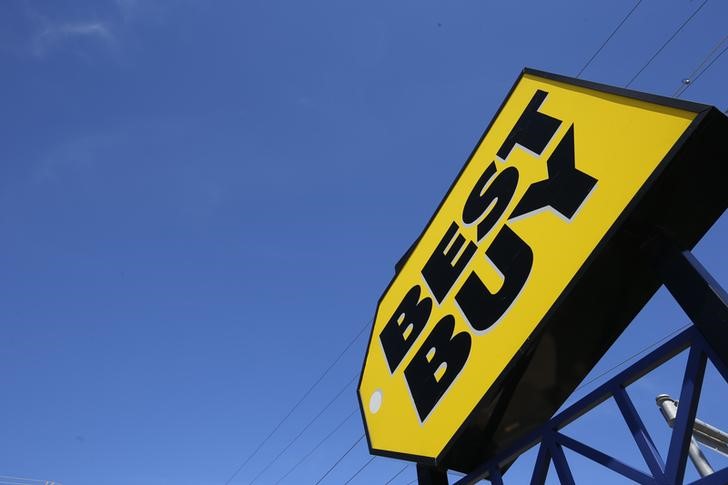US stock futures flounder amid tech weakness, Fed caution
On Wednesday, Citi analysts made adjustments to their view on Best Buy (NYSE:BBY) shares, lowering the price target to $93 from the previous $105, while reiterating a Buy rating for the company. The stock has experienced significant pressure recently, declining nearly 17% in the past week and currently trading at $75.20. According to InvestingPro data, the stock’s RSI suggests it’s in oversold territory, potentially presenting an opportunity for investors. The decision comes amid Best Buy’s announcement of positive fourth-quarter same-store sales (SSS) and expectations of earnings before interest and taxes (EBIT) margin growth. Despite these positive indicators, Citi expressed concerns over the potential negative impact of tariffs on the company’s future performance.
Citi’s analysts noted that while Best Buy is showing signs of improvement, the current tariff environment introduces a level of uncertainty that could pose downside risks. They acknowledged that some investors believe Best Buy’s 2025 financial guidance should have accounted for the potential impact of tariffs. However, Citi also pointed out the difficulty in forecasting the consequences of tariffs due to various factors, including how price increases might affect unit sales, the company’s cost mitigation efforts, and the possibility that tariffs might be reduced or removed through geopolitical negotiations.
Citi’s stance is that it is challenging to predict the exact impact of tariffs on Best Buy’s financials. Therefore, their revised model takes a conservative approach, setting the forecast at the mid-point of Best Buy’s 2025 guidance, rather than assuming the company’s initial earnings per share (EPS) guidance is conservative as they typically would. InvestingPro analysis indicates Best Buy is currently undervalued, with the company maintaining strong fundamentals including a healthy 22.6% gross profit margin and robust cash flows sufficient to cover interest payments. For deeper insights into Best Buy’s valuation and financial health, investors can access the comprehensive Pro Research Report, available exclusively to InvestingPro subscribers.
In their analysis, Citi discussed potential bear case scenarios related to tariff implications. Despite the lowered price target, Citi sees the recent drop in Best Buy’s stock price as an opportunity for investors, offering an attractive risk/reward balance. This perspective hinges on the possibility that tariff risks could subside and consumer spending might recover, following the softness observed across the retail sector in February.
Citi’s revised price target of $93 is based on approximately 13 times their fiscal year 2027 EPS estimates for Best Buy. The analysts concluded by maintaining their Buy rating on the stock, suggesting that the current market conditions, coupled with Best Buy’s performance, present a favorable investment opportunity despite the reduced target price. Best Buy has demonstrated strong shareholder returns, maintaining dividend payments for 23 consecutive years with a current yield of 5%. InvestingPro reveals the company has raised its dividend for seven consecutive years, while analyst targets range from $80 to $115, reflecting diverse market perspectives on the stock’s potential.
In other recent news, Best Buy reported its fourth-quarter earnings for fiscal year 2025, exceeding analyst expectations with an earnings per share (EPS) of $2.58, compared to the forecasted $2.39. The company also achieved a revenue of $13.9 billion, which included a 0.5% growth in comparable sales. Despite these positive results, Best Buy’s stock experienced a decline, reflecting investor concerns about future growth and operational challenges. Analysts from DA Davidson and Jefferies made adjustments to their price targets for Best Buy, with DA Davidson lowering it to $110 while maintaining a Buy rating, and Jefferies reducing it to $92, also maintaining a Buy rating. Both firms noted the impact of tariffs as a significant concern, with DA Davidson emphasizing Best Buy’s core business strength and Jefferies highlighting the company’s cost discipline and positive sales cycle. Best Buy’s guidance for fiscal year 2026 projects revenue between $41.4 billion and $42.2 billion, with an EPS range of $6.20 to $6.60. The company plans to close 5-10 stores, indicating potential shifts in its operational strategy. Despite external pressures, Best Buy’s focus on digital platforms and AI-powered services suggests an ongoing strategic shift to adapt to market conditions.
This article was generated with the support of AI and reviewed by an editor. For more information see our T&C.
